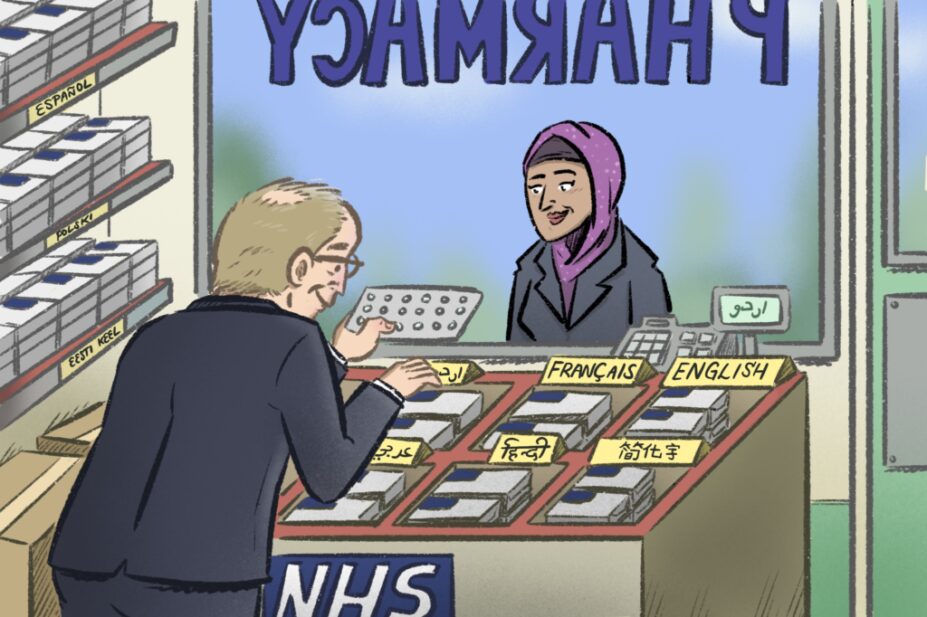
Wes Mountain/The Pharmaceutical Journal
Immigration levels and the population of the UK are increasing, resulting in a culturally richer community[1]. Roughly one in six people in England and Wales were born outside of the UK, the majority of which were born outside of the EU[2]. This contributes to the number of residents who do not speak English as their first language.
Non-proficient English speakers are more likely to report being in poor health, which may be attributed to communication challenges when trying to access healthcare[3,4]. Data from the census show the number of non-proficient English speakers across England and Wales is increasing and exceeded 1 million people as of 2021[5].
NHS England’s ‘Guidance for commissioners’ states that a patient’s language and communication requirements should not impact the quality of care they receive when accessing healthcare services[6]. For this reason, healthcare professionals are expected to use services that improve communication when significant language barriers are encountered. Access to language barrier services should therefore be made available to all patient-facing pharmacy professionals across sectors, to allow consistent and equitable care.
Issues with accessibility
Unfortunately, access to language barrier services, such as interpretation, varies considerably across workplaces. In 2022, an internal survey completed by NHS England revealed that several different providers of translation and interpretation services are used in primary care across England[7]. Some regions have large contracts in place that cover many primary care providers, while other regions have lots of smaller localised contracts[7]. Currently there are no specific providers recommended to commissioners by NHS England, and this variety impacts on the consistency of care the NHS is currently delivering[6–8].
Community pharmacy professionals appear to have poorest access to language barrier services, with 86% reporting no access at all, despite being a primary point of care[8]. Locally commissioned language barrier services do exist in some areas for those in community; however, many pharmacy professionals are unaware of them, meaning they are not sufficiently utilised[7,8].
In the absence of effective communication, there is greater potential for clinical decisions to be made without full inclusion of the patient
Despite working in culturally rich areas across primary and secondary care, my experience communicating with patients using language barrier services has often been poor. This primarily owes to the extensive time needed to access them, which can impact service provision. Anecdotal discussions with fellow pharmacy professionals have revealed similar issues are being experienced across sectors, resulting in pharmacy professionals avoiding using language barrier services. Recognising the potential disparities caused by these issues, our report, published in the spring 2023 edition of PM Healthcare Journal, provides insight into the impact that language barriers could be having on patient care[8].
The report’s findings were alarming but unsurprising: out of 468 pharmacy professionals surveyed across patient-facing sectors, 62% of respondents said they believe that patients who experience language barriers receive poorer quality care. Only 21% said the care provided to patients who experience language barriers is equitable with those who do not experience them[8]. Excluding respondents who said they were ‘unsure’ in their answers, these proportions rose to 73% and 25%, respectively.
Lack of workplace-based support
Guidance suggests an interpreted consultation should take approximately twice as long; however, pharmacy professionals feel their workplaces do not support them with the additional time needed to use interpreters[6,8]. Furthermore, many pharmacy professionals report never being shown how to access the language barrier services they have available to them[8]. In the absence of effective communication, there is greater potential for clinical decisions to be made without full inclusion of the patient. This conflicts with shared-decision-making guidance that suggests patients have better outcomes if they are actively involved in their own healthcare[9].
Risks to patient safety and our workforce
The report found that pharmacy professionals across all sectors experience anxiety, helplessness and frustration when trying to communicate with patients who experience language barriers, which is often linked to inadequate training or a lack of support from their workplaces. These feelings can have a detrimental effect on our workforce’s mental health and wellbeing, contributing to lower quality care provision. A lack of workplace-based support may also promote stressful working environments that can affect retention within the profession[8].
To overcome the shortfall in resources, many healthcare professionals opt to use non-validated services, such as Google Translate[8,10]. Worryingly, the BMJ reported in 2014 that Google Translate only offered 57.7% accuracy when used for medical phrase translations; therefore, it is not recommended for medical-related communications[10].
In practice, using a patient’s relative or friend to interpret is also common, despite the potential for bias and misinterpretation. One difficulty here is establishing whether the patient consents to sharing their personal information with the third party[6,9].
Despite the risks, non-validated methods such as these remain fast and accessible ways to communicate[8,10]. Greater timeliness and accessibility of language barrier services would help to reduce the reliance on these methods, minimising the risk to patient safety.
Lack of resource
The current translation and interpretation resourcing available to NHS bodies does not seem to be clearly defined or formally allocated; it also appears insufficient to quality assure language barrier services across England.
Translation and interpretation guidance does exist, which commissioners are expected to follow, but this has not been updated since 2018[6]. It is also unclear to what extent this guidance is adhered to. Some commissioners have contracts in place for language barrier services, but not all are aware which primary care services these cover. Other commissioners were unaware of having any contracts in place at all[7].
Time for change
To resolve the problem, the barriers to effective care that are attributed to language barriers must be recognised and prioritised by commissioners and pharmacy employers.
There needs to be consideration to fund quality-assured and centrally-shared language barrier services. This would not only help improve the current accessibility issues and ensure greater consistency of care, but it would also reduce reliance on potentially risky methods.
Workplaces should ensure that their staff have access to high-quality language barrier services to enable them to provide equitable care
Collation of local information would help pharmacy professionals to determine what support is available to them in their area. This will help to ensure language barrier services are sufficiently utilised and patient care does not suffer. For those without access, urgent support measures should be considered.
Workplaces should ensure that their staff have access to high-quality language barrier services to enable them to provide equitable care. They also have a responsibility to support their staff with adequate time to properly care for patients who experience language barriers, recognising additional time may be needed.
As a minimum, workplaces who already have access to language barrier services should encourage their use and ensure patient-facing staff know how and when to use them appropriately.
In the future, the NHS could support the creation of a validated, accessible medical translation app, which would work in a similar way to Google Translate. This could be a way to ensure that healthcare professionals can quickly share information with patients in the absence of interpretation services safely. It would also be particularly helpful for those with limited access. NHS England could support integrated care boards (ICBs) with these cross-system based improvements.
ICBs have a statutory duty to improve population health by reducing the inequalities that exist when accessing healthcare services[11]. Strengthened relationships between ICBs and healthcare providers should encourage workplaces to better support their staff to overcome language barriers.
All patient-facing pharmacy professionals should ascertain what resources are available to them to help them overcome language barriers. They should use their judgement to determine whether effective communication could be impacted by a language barrier and take appropriate action using these resources.
The effect of language barriers on patient care from the patient’s perspective should also be investigated to gain a more rounded understanding of the attributed health inequalities.
Conclusion
Patients who experience language barriers represent a vast number of our population and this number continues to grow. Inclusive care is essential to allow the NHS to continue to evolve and meet the needs of the diverse population we serve. Adequate resourcing into translation and interpretation services is needed to overcome the barriers our pharmacy professionals and patients currently face. If we choose to ignore this issue, health inequalities will continue to grow, and we will continue to fail our patients.

Health inequalities
The Royal Pharmaceutical Society’s policy on health inequalities was drawn up in January 2023 following a presentation by Michael Marmot, director of the Institute for Health Equity, at the RPS annual conference in November 2022. The presentation highlighted the stark health inequalities across Britain.
While community pharmacies are most frequently located in areas of high deprivation, people living in these areas do not access the full range of services that are available. To mitigate this, the policy calls on pharmacies to not only think about the services it provides but also how it provides them by considering three actions:
- Deepening understanding of health inequalities
- This means developing an insight into the demographics of the population served by pharmacies using population health statistics and by engaging with patients directly through local community or faith groups.
- Understanding and improving pharmacy culture
- This calls on the whole pharmacy team to create a welcoming culture for all patients, empowering them to take an active role in their own care, and improving communication skills within the team and with patients.
- Improving structural barriers
- This calls for improving accessibility of patient information resources and incorporating health inequalities into pharmacy training and education to tackle wider barriers to care.
- 1Long-term International Migration, Provisional: Year ending June 2021. Office for National Statistics. 2021.https://www.ons.gov.uk/peoplepopulationandcommunity/populationandmigration/internationalmigration/bulletins/longterminternationalmigrationprovisional/june2021 (accessed Jul 2023).
- 2International Migration, England and Wales: Census 2021. Office for National Statistics. 2022.https://www.ons.gov.uk/peoplepopulationandcommunity/populationandmigration/internationalmigration/bulletins/internationalmigrationenglandandwales/census2021 (accessed Jul 2023).
- 3People who Cannot Speak English Well are More Likely to be in Poor Health. Office for National Statistics. 2015.https://www.ons.gov.uk/peoplepopulationandcommunity/culturalidentity/language/articles/peoplewhocannotspeakenglishwellaremorelikelytobeinpoorhealth/2015-07-09 (accessed Jul 2023).
- 4Clinical Investigation Booking Systems Failures: Written Communications in Community Languages. HSIB. 2023.https://www.hsib.org.uk/investigations-and-reports/clinical-investigation-booking-systems-failures/ (accessed Jul 2023).
- 5Main Language, English Language Proficiency, and Household Language in England and Wales, Census 2021 data. Office for National Statistics. 2022.https://ons.gov.uk/peoplepopulationandcommunity/culturalidentity/language/bulletins/languageenglandandwales/census2021 (accessed Jul 2023).
- 6Guidance for Commissioners: Interpreting and Translation Services in Primary Care. NHS England. 2018.https://www.england.nhs.uk/wp-content/uploads/2018/09/guidance-for-commissioners-interpreting-and-translation-services-in-primary-care.pdf (accessed Jul 2023).
- 7Current state of Translation and Interpretation provision: Summary of T&I survey (unpublished). NHS England. 2022.https://future.nhs.uk/NHSTranslationInterpretingHub/view?objectID=36731984 (accessed Jul 2023).
- 8Patel J. The Impact of Language Barriers on Patient Care: A Pharmacy Perspective. PM Healthcare Journal. 2023.https://www.pmhealthcare.co.uk/uploads/Journals/PM%20Healthcare%20Journal%20-%20Spring%202023_V4.pdf (accessed Jul 2023).
- 9Making Shared Decision-making a Reality: No Decision About Me, Without Me. The King’s Fund. 2011.https://www.kingsfund.org.uk/publications/making-shared-decision-making-reality (accessed Jul 2023).
- 10Patil S, Davies P. Use of Google Translate in medical communication: evaluation of accuracy. BMJ. 2014;349:g7392–g7392. doi:10.1136/bmj.g7392
- 11System Working as a Vehicle to Address Health Inequalities. Health Inequalities: A Core Concern. NHS Providers. https://nhsproviders.org/health-inequalities-a-core-concern/system-working-as-a-vehicle-to-address-health-inequalities#:~:text=The%20Bill%20sets%20out%20that,by%20the%20provision%20of%20health (accessed Jul 2023).
1 comment
You must be logged in to post a comment.



Retired, I am Deputy Chair of Healthwatch Shropshire which as an organisation which seeks to give voice to the seldom heard. We are aware of the difficulties some individuals face in accessing healthcare. Often these individuals are very reluctant to voice their concerns and it takes a long time to gain their trust. It is a deep seated problem, not only for those who seek to give exemplary healthcare but also those who fail to receive it.